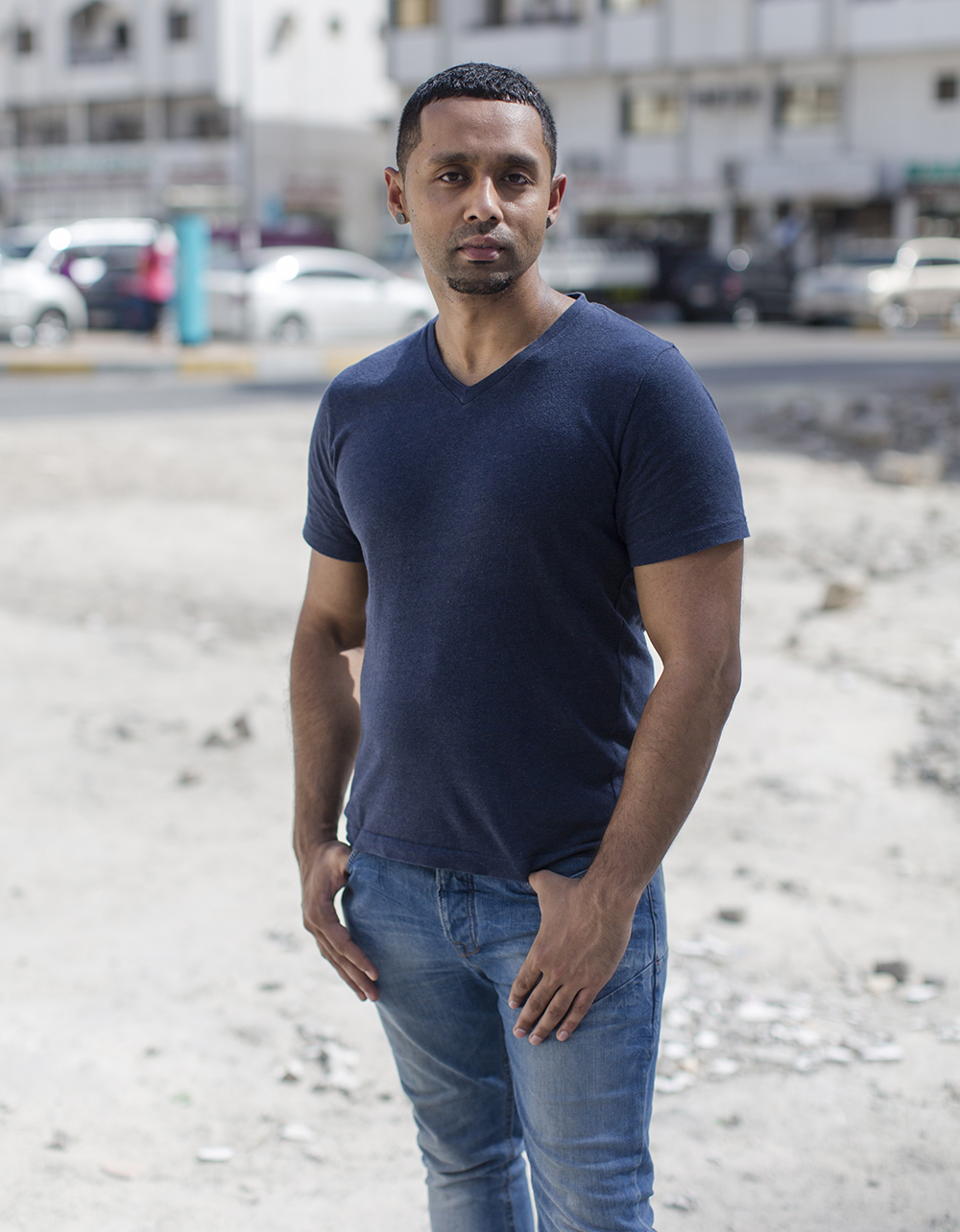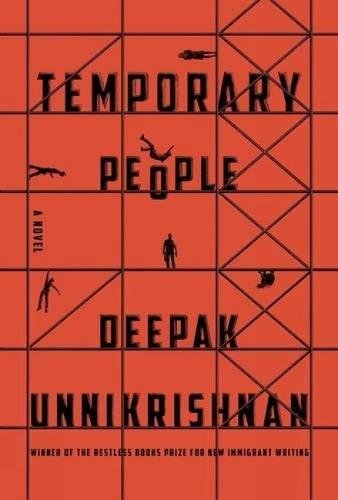
Deepak Unnikrishnan Photo: Philip Cheung
In Temporary People, Deepak Unnikrishnan delves into the multiple worlds and identities of immigrant workers of the UAE. He says the purpose, apart from storytelling, was to upend the narratives of the Gulf’s temporary inhabitants
Deepak Unnikrishnan is the author of Temporary People (Simon & Schuster India), a collection of stories that is neither a novel nor exactly a documentary. It’s about migrants who make a home out of an alien land; as in the case of Malayalees, a revolutionary tribe who is enslaved life long to the Middle East sheikhs so they can make a living and buy big TVs.
Unnikrishnan sees these temporary people as a mutant generation, where they are more a machine than a human. His way of seeing these people is as unique as his way of telling their stories. But it’s not without realism. Indeed often it’s so real, it’s just like the life some of us get to live.
Unnikrishnan is a Keralite himself, though a resident of the US. He teaches in New York University, Abu Dhabi. Penguin Random House India has bought the Indian rights of Temporary People and will be releasing it in September this year.
In an email interview, Unnikrishnan says he wanted the work’s form to mirror the transient nature and chaos of the city of his boyhood. “Before it came out, I asked my publisher to call the book a ‘book,’ not a novel in stories or a short story collection, because I thought the word ‘book’ represented everything the work wanted to be. I was gently and firmly told no,” he says. Excerpts from an interview:
C P SURENDRAN: In your novel, Temporary People, man becomes a building. Another swallows a passport and becomes that. Tongue pops out and crosses the street. In the book, are you saying that the Gulf reduces its Indian tenants into a function? A machine to meet a need? A self-sacrifice for a living/consumption?
DEEPAK UNNIKRISHNAN: In the Gulf, if you are not a tourist, but a temporary inhabitant, your function matters. You may be working; you may be a son or a daughter to parents who are working; you may be married to a person who is working. Whatever your function, chances are you have your eye on the time. Or you are telling yourself stories, set in the near future, when leaving becomes imminent.
Temporary People lingers on people wedded to visas and passports; individuals with likes and dislikes; people far more complex than some of the long and short-form narratives I have read in books and journals, men, women and children hard to pin down. People with love, sadness, rage, or a combination of emotions, for the place/city/country they’ve inhabited for a while.
C P SURENDRAN: Chabter 6 tells the story of Gulf Mukundan, a construction labourer, who under a set of certain circumstances, has sex with his male friend and is shamed and sent back. And later goes missing. His son Saji goes a little nuts. In the last para, the mother tells Saji: “Admirable how you could love a man you barely knew. It’s as if you are desperate for the world to know that you miss your father…. I won’t be allowed to miss him because I’ll be staring at you as you grow more and more like him…. One look at you and everyone will know that you are your father’s child. So tell me, son, be truthful now, children who lie to their mothers rarely fare well in life. Do you think about boys?”
It’s a bitter, true passage. And, to my mind, demands honesty on the narrator’s part that must hurt in the telling of it. In this passage, for instance, the boy almost stands violated. And such visceral passages are strewn through the book. Are you making a deliberate effort to go into areas you don’t normally like to go?
DEEPAK UNNIKRISHNAN: In the moment you’re referencing, a mother is confronting her child about his potential queerness. She doesn’t mask her rage. But it’s how she asks the question that robs the boy of a hiding place. He doesn’t know what he is yet, but his mother forces him to overthink what he might be. She doesn’t call him anything, you understand, but she doesn’t have to.
I didn’t make a deliberate attempt to write visceral passages. I just didn’t want sex or violence to be a deterrent to my writing. I wanted my characters to explore sex and rage without thinking too much. They don’t always know what they’re talking about, or doing. But they swear and they love and they rage. And they flounder and they succeed, meaning they are normal enough. Those are the people I am most interested in writing about.
When I was in school, most of my schoolteachers at Abu Dhabi Indian School pretended sex or violence didn’t exist. Everyone pussyfooted around either topic, including my parents. If I am deliberate about anything, it’s about wanting to make my writing count for something.
C P SURENDRAN: Chabter 8 titled “Ivday (Here). Avday (There)” is both sad and funny. The telephone conversation between the son (Here) and Mother (There) is typical of the Kerala situation for close to 50 years. It is an expression of the migrant’s nostalgia for a place he has more or less forfeited for a living which might also be a way of dying. The really short story might as well have occurred to you in Malayalam first. If this is so, is that a general principle guiding the writing of Temporary People, although it may not have as authentic an existence outside the English language?
DEEPAK UNNIKRISHNAN: My Malayalam is rarely on standby when I converse in English. Or vice versa. English is my strongest tongue, but every other language in my possession, no matter how broken, slips into my English. When I am speaking to my sis, we don’t just switch back and forth between Malayalam and English. We speak in English infused with Malayalam, or vice versa. When that happens, Malayalam sort of becomes English-like. I used to be ashamed of my languages mingling like that when I was a kid, less so now. Temporary People is about rhythm too, what a city that’s been scrutinized/shamed, but rarely explored, sounds like. I could’ve opted for the Queen’s English, or written something American-like, but I didn’t want to do either. Or maybe I couldn’t do either.
I wanted to write a book that was a product of the place that grew me up, something only a writer of my background could write. I recognize that the book isn’t an easy read, but I stand by my decision. When Temporary People gets translated into Malayalam, how the translator plays with rhythm will prove to be crucial, because the book needs rhythm to function. It’s a book about people, not only where they are/came from, but also what they sound like, about languages dancing with and around each other. As long as the book’s translator(s) respects those rules, the book’s soul will stay intact.
C P SURENDRAN: The free use of Malayalam words. There is a dare in that freedom. Is there a subtext to it?
DEEPAK UNNIKRISHNAN: Scrape out the Malayalam from me and I become a different person. I don’t think the same. There is no dare in writing what feels true, or using words that feel right. ‘Home’ for instance is a solid word, but it doesn’t hit me in the gut like ‘veed’. You should hear my amma say veed out loud, the various inflections she gets out of it. In that register, veed cannot be house or crib or domicile or address. Veed needs to be veed, to sound like veed. But then in a sentence set in the Gulf, written by a writer from Abu Dhabi, with parents from Kerala, veed could only be veed. The subtext is straightforward. I don’t always separate Malayalam or English when I think through thoughts. So when I write, instinct takes over. When I was learning to read English, whether I was reading the American or the English cannon, I had to look up idioms and slang, or words whose origins were Latin or French or German. As a writer of color who needs to hear multiple languages to feel sane, I am simply asking readers to offer me the same courtesy with the words I deploy, but I am not asking for their permission to do this.
C P SURENDRAN: Kloon is the story of a boy Chainsmoke being paid by a rich woman in an abaya who likes to see him masturbate. Chainsmoke’s humiliation at her hands, and later as a clown in a shop to make a supplementary income finally turns into a story of revenge; one that of the temporary people against the whole lot of the Permanent People. It’s also a very layered story told with a throwaway brilliance. How deep do you feel the anger and angst of your characters? How much of you are present in what you write?
DEEPAK UNNIKRISHNAN: I wonder how people process things, but don’t we all? Why is my lover mad? Why is dad the way he is? Why is my kid such a douche? What’s the cashier’s deal anyway?
Angst is one emotion I am sensitive towards. I am not anxious all the time, but I tend to worry. And I feel things as much as the next person. Maybe I just spend far too much time wondering why someone said/did something. But I am also drawn to people who are impulsive, people who do things because they felt an urge.
I am present as an observer when I write, acutely aware of the world I am building, but I am not always what I write, even though readers may assume me to be, but I can’t control what readers think of me. I would be lying if I said my writing isn’t informed by my understanding of the various worlds I occupy. But my writing is also about me trying to process these worlds by telling/mining tales.
Page
Donate Now
Comments
*Comments will be moderated











